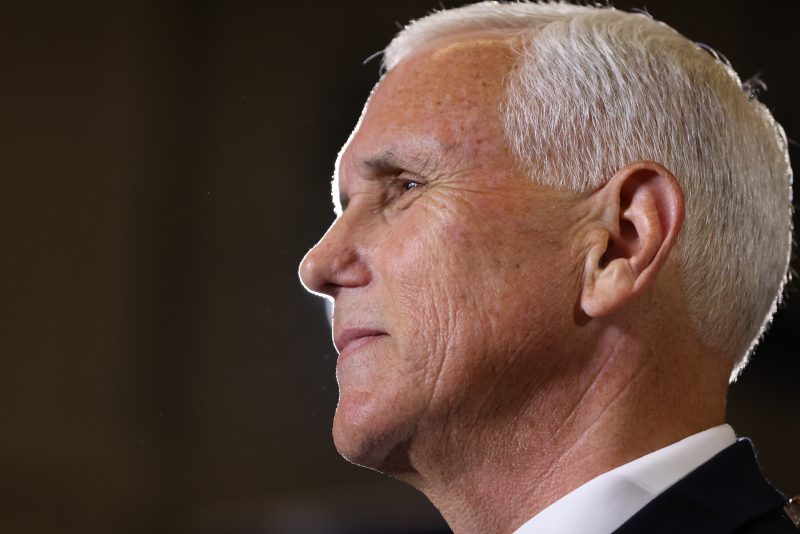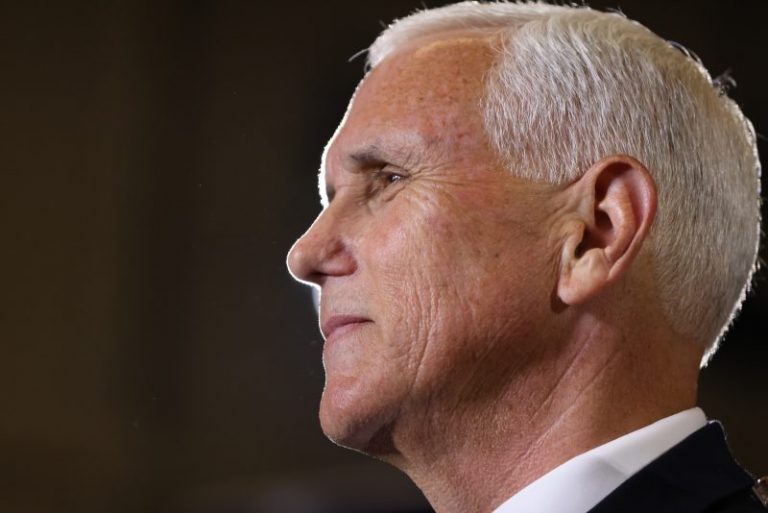
If Mike Pence does nothing more as a candidate for president, he has framed a central question of the 2024 election: The Constitution or Donald Trump? But if that sounds like a straightforward question, which it is, many of Trump’s rivals for the Republican presidential nomination are providing convoluted answers in response, if they answer the question at all.
The Jan. 6, 2021, attack on the U.S. Capitol is a topic that most of the candidates prefer to ignore. But not Pence. In a speech announcing his candidacy Wednesday in Ankeny, Iowa, he met it head-on.
He spoke with the credibility of someone who was vilified by Trump on Jan. 6 for not standing in the way of the ratification of Joe Biden’s victory in the electoral college and who was then on the receiving end of chants of “Hang Mike Pence” from the pro-Trump rioters.
Pence said Trump’s “reckless words” that day had endangered his family and everyone else at the Capitol. He contrasted his own conduct on Jan. 6 with that of a president whom he had served loyally for four years. Trump, Pence said, “demanded I choose between him and our Constitution. Now voters will be faced with the same choice. I chose the Constitution, and I always will.”
The charges against Trump in the Justice Department’s 37-count criminal indictment over his handling of secret documents, unsealed on Friday, add to the list of ways in which the former president has frequently disregarded his constitutional oath.
Pence made clear that the choice he framed should become part of the equation that every voter who participates in a Republican primary or caucus will have to solve, although many may try to ignore it. The former vice president gave his answer in Iowa. “Anyone who puts themselves over the Constitution should never be president of the United States,” he said. “And anyone who asks someone else to put them over the Constitution should never be president again.”
Between now and when voting starts early next year, Trump’s other rivals for the nomination could be asked to answer the same question. Do they agree with Pence that Trump is not fit to serve another term in the White House? The Pence question could be among the issues raised during the first Republican debate in Milwaukee on Aug. 23.
Two candidates have said clearly where they stand on this. Former New Jersey governor Chris Christie is running his entire campaign on the premise that, by his conduct, his onetime friend Trump is no longer fit to serve as president. Former Arkansas governor Asa Hutchinson has staked his hopes of becoming the nominee in large part on his assertion that Trump has disqualified himself. Florida Gov. Ron DeSantis, who is seen as Trump’s strongest challenger, has been silent on the Pence question.
As the summer campaign season continues, Republican voters will hear about many issues from the field of candidates: border security, relations with China, abortion, transgender rights, energy independence, inflation. The candidates will repeatedly use the word “woke” (often without defining it) to draw contrasts with President Biden and the Democrats. They will mostly agree on these issues; the differences will be matters of degree, emphasis and volume.
They also will draw contrasts with Trump, sometimes explicitly but more often obliquely. They will say that Trump’s policies were generally good but that it is time to move on from him.
Most, however, prefer to skirt the issue of whether someone who sought to subvert the Constitution by trying to overturn the results of the 2020 election, who inflamed the mob that attacked the Capitol, and who still claims falsely that the election was rigged and stolen should be returned to the Oval Office.
The Justice Department’s investigation into Trump’s role in the attack on the Capitol continues, as does the investigation in Georgia led by Fulton County District Attorney Fani T. Willis into the former president’s efforts to overturn the results of the 2020 election in that state. Charging decisions by prosecutors are still to come. Meanwhile, Trump has been indicted in the case involving his handling of classified documents, making him the first former U.S. president to face federal criminal charges.
In response to the indictment, Hutchinson called for Trump to stand down as a candidate for president. Christie said the conduct alleged in the indictment shows Trump should not become president again. It is notable that Hutchinson and Christie are former U.S. attorneys. In the face of detailed examples of how Trump sought to hide classified documents from officials, Pence and DeSantis leaped to defend him, calling the indictment the product of a weaponized Justice Department.
Carlos Curbelo, a former Republican House member from Florida, sees a measure of hypocrisy in these defenses. “If you listen carefully you can hear all the GOP presidential candidates celebrating the #Trumpindictment while publicly pretending to be outraged, disappointed, or concerned,” he tweeted Friday.
From that perspective, the rush by some of Trump’s rivals to condemn the Justice Department reflects a desire to play to a Republican base still fiercely loyal to Trump as much as the condemnation is a true defense of the former president. The Republican Party once was a champion of law and order and by implication a defender of the agencies of government assigned to root out criminals. That’s no longer the case.
Republican pollster Bill McInturff recently released an analysis of the changes in political attitudes over the past few decades, based on polling by NBC News. Among the charts is one that shows attitudes toward the FBI, broken down by party identification. In 1995, 52 percent of Republicans said they had positive feelings toward the FBI. By last year, that number had fallen to 18 percent. By contrast, Democrats are more positive about the agency, rising from 50 percent positive in 1995 to 70 percent last year.
Pence’s decision to criticize the Justice Department over its indictment of Trump in the documents case underscores how even he cannot provide a consistent answer to the question he posed in his announcement speech. DeSantis also has decided to focus on the Justice Department’s conduct rather than assess what the indictment says about the former president.
Where the Republican candidates are most conflicted, or perhaps hypocritical, is on the pledge they are being asked to make as one of the requirements to qualify for the upcoming GOP debates. All candidates are required by the Republican National Committee to pledge to support the party’s nominee in the event they don’t win.
Answering in the affirmative, as Pence did on Fox News shortly after his announcement speech, is the reflexive answer for anyone who wants into the debates. Trump’s rivals will fudge on this question, claiming they are answering affirmatively because they expect to be the nominee. But they all know that today, Trump is the front-runner for the nomination. They also know that the new indictment will, for now at least, make him stronger with his most loyal followers.
Still, it makes a mockery of the claim that the former president had already disqualified himself from serving as president by violating his oath to the Constitution after losing the 2020 election. If Trump is not fit to be president, what is the rationale for pledging to support him?
No matter how much hypocrisy or discomfort it generates, what Pence said in Iowa still remains central to the choice that every voter, and every Trump rival for the nomination, will have to confront in 2024: The Constitution or Donald Trump?
Ongoing investigations involving Donald Trump
1/7
End of carousel


Comments are closed.